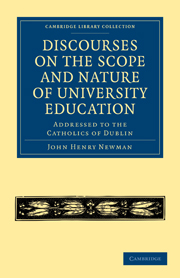Book contents
- Frontmatter
- PREFACE
- Contents
- CORRIGENDA
- Discourse I Introduction
- Discourse II Theology a Branch of Knowledge
- Discourse III Bearing of Theology on other Branches of Knowledge
- Discourse IV Bearing of other Branches of Knowledge on Theology
- Discourse V General Knowledge viewed as One Philosophy
- Discourse VI Philosophical Knowledge its own end
- Discourse VII Philosophical Knowledge viewed in relation to Mental Acquirements
- Discourse VIII Philosophical Knowledge viewed in relation to Professional
- Discourse IX Philosophical Knowledge viewed in relation to Religion
- Discourse X Duties of the Church towards Philosophy
- Appendix
Discourse III - Bearing of Theology on other Branches of Knowledge
Published online by Cambridge University Press: 05 July 2011
- Frontmatter
- PREFACE
- Contents
- CORRIGENDA
- Discourse I Introduction
- Discourse II Theology a Branch of Knowledge
- Discourse III Bearing of Theology on other Branches of Knowledge
- Discourse IV Bearing of other Branches of Knowledge on Theology
- Discourse V General Knowledge viewed as One Philosophy
- Discourse VI Philosophical Knowledge its own end
- Discourse VII Philosophical Knowledge viewed in relation to Mental Acquirements
- Discourse VIII Philosophical Knowledge viewed in relation to Professional
- Discourse IX Philosophical Knowledge viewed in relation to Religion
- Discourse X Duties of the Church towards Philosophy
- Appendix
Summary
When men of great intellect, who have long and intently and exclusively given themselves to the study or investigation of some one particular branch of secular knowledge, whose mental life is concentrated and hidden in their chosen pursuit, and who have neither eyes nor ears for anything which does not immediately bear upon it, when such men are at length made to realize that there is a clamour all around them, which must be heard, for what they have been so little accustomed to place in the category of knowledge as Religion, and that they themselves are accused of disaffection to it, they are impatient at the interruption; they call the demand tyrannical, and the requisitionists bigots or fanatics. They are tempted to say, that their only wish is to be let alone; for themselves, they are not dreaming of offending any one, or interfering with any one; they are pursuing their own particular line, they have never spoken a word against anyone's religion, whoever he may be, and never mean to do so. It does not follow that they deny the existence of a God, because they are not talking of it, when the topic would be utterly irrelevant. All they say is, that there are other beings in the world besides the Supreme Being; their business is with them. After all, the creation is not the Creator, nor things secular religious.
- Type
- Chapter
- Information
- Discourses on the Scope and Nature of University EducationAddressed to the Catholics of Dublin, pp. 67 - 102Publisher: Cambridge University PressPrint publication year: 2010First published in: 1852

